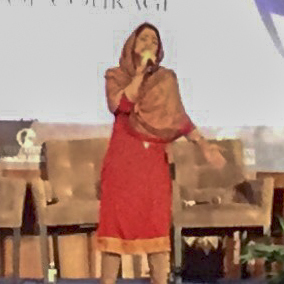A Quote by Kristen Soltis Anderson
Not long ago, women in Afghanistan were required by Taliban leadership to be covered nearly head-to-toe and were barely allowed to leave the home; that young Afghan women today are not only accessing an education but are able to meet young people from around the world and cheer on a robot of their own making is something beautiful.
Related Quotes
According to what we've been seeing recently in the area where the terrorists control, where they ban people from going to schools, ban young men from shaving their beards, and women have to be covered from head to toe, and let's say in brief they live the Taliban style in Afghanistan, completely the same style.
It just struck me as really odd that there were all of these conversations going on about what young women were up to. Were young women having too much sex? Were young women politically apathetic? Are young women socially engaged or not? And whenever these conversations were happening, they were mostly happening by older women and by older feminists. And maybe there would be a younger woman quoted every once in a while, but we weren't really a central part of that conversation. We weren't really being allowed to speak on our own behalf.
There was a time when the women of Afghanistan - at least in Kabul - were out there. They were allowed to study, they were doctors and surgeons, walking free, wearing what they wanted. That was when it was under Soviet occupation. Then the United States starts funding the mujahideen. Reagan called them Afghanistan's "founding fathers." It reincarnates the idea of "jehad," virtually creates the Taliban.
I specially want to have young women not to wait as I did until my children were grown, but young women to come in to gain their seniority so they could be respected leaders at a much earlier age. It's important for all women to see young women who share their experience whether it's as a working mom with young children, who understands the struggle and the aspirations of young women in a similar situation. And if they don't have family and they're pursuing their career women should see that as well.
In 2001, we were told that the war in Afghanistan was a feminist mission. The marines were liberating Afghan women from the Taliban. Can you really bomb feminism into a country? And now, after 25 years of brutal war - 10 years against the Soviet occupation, 15 years of US occupation - the Taliban is riding back to Kabul and will soon be back to doing business with the United States.
This happened years and years ago, right as our videos were first being played on MTV. The interviewer said, "You guys are getting famous now. Are you going to be riding around in limousines, doing drugs, and sleeping with beautiful women?" And I was a precocious young man, and my snappy comeback to that cheerful question was, "We're willing to sleep with beautiful women." But no part of the question was in the article.
The draconian prohibitions of the Taliban years and the gains Afghan women have achieved since the Taliban government was overthrown in 2001 are now well known and often cited: Today, Afghans lucky enough to live in secure regions can go to school, women may work in offices, and the burqa is no longer mandatory.
There’s a saying in Africa, if you give a woman empowerment, you empower a community, you empower men, you empower man. When women become empowered and live in their strength it’s beneficiary to others, and I think as young women today we sometimes forget that we are standing on the struggle of other women. Those women had to stand up to make a change, and they were not popular, and now we’re making them unpopular again.
Two thirds of the work in the world is done by women. Women own 1 percent of the assets. Young women are sold into prostitution, forced labour, premature marriage, forced to have children they don't want or they can't support. They're abused, raped, beaten up. Domestic violence is supposed to be a cultural problem. They are the first victims of war, fundamentalism, conflict, recession. And young women who have access to education and health care and have resources think that everything was done, they don't have to worry.




































